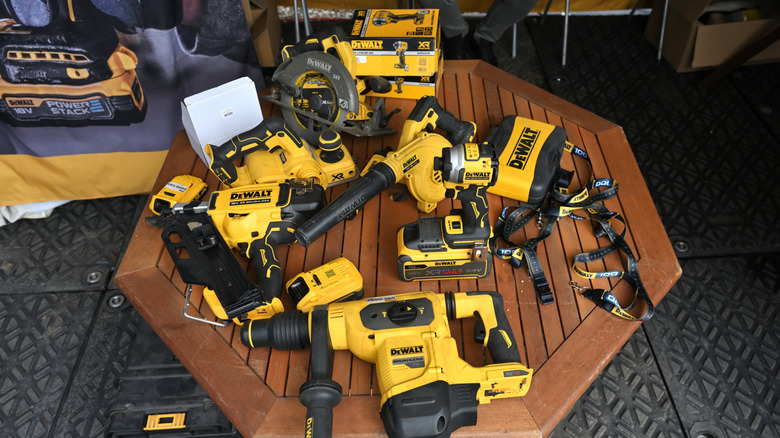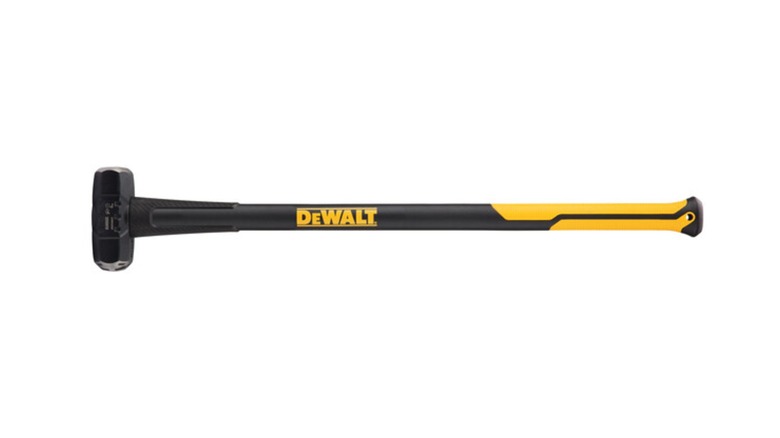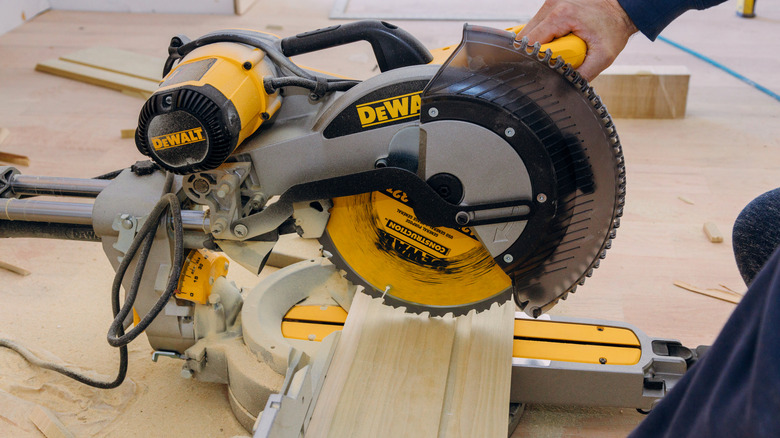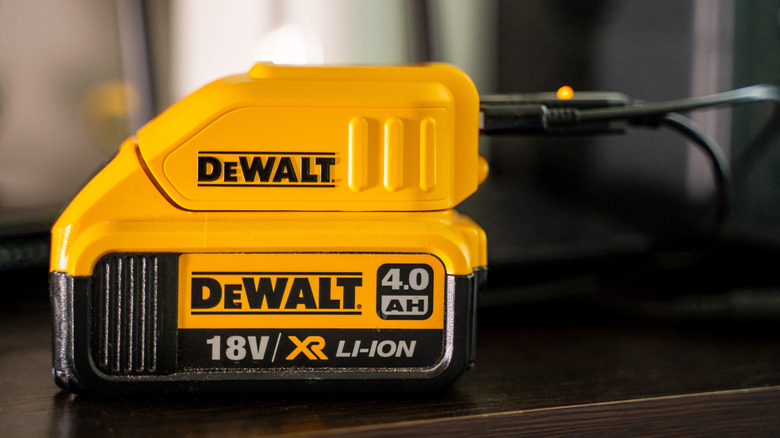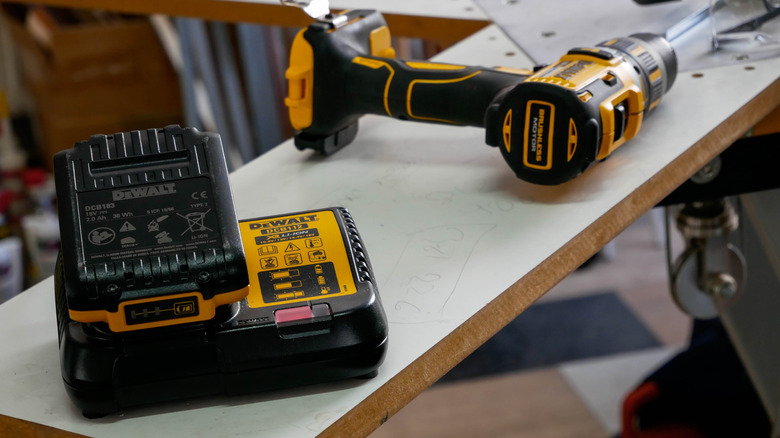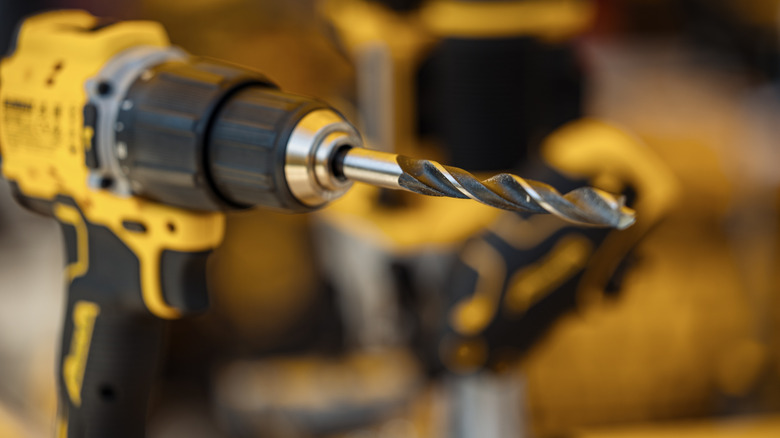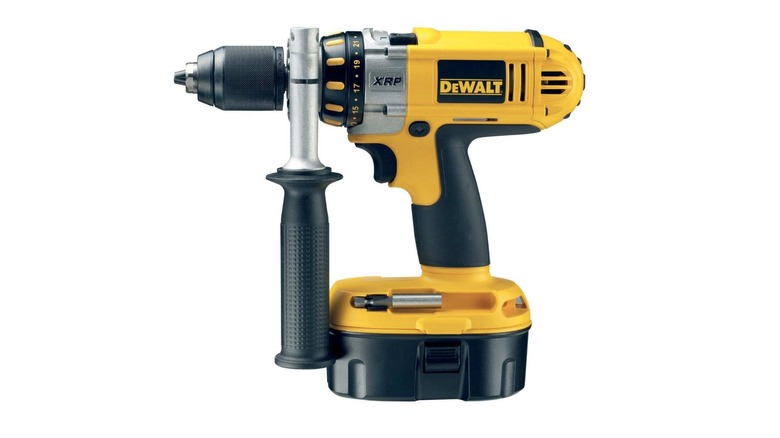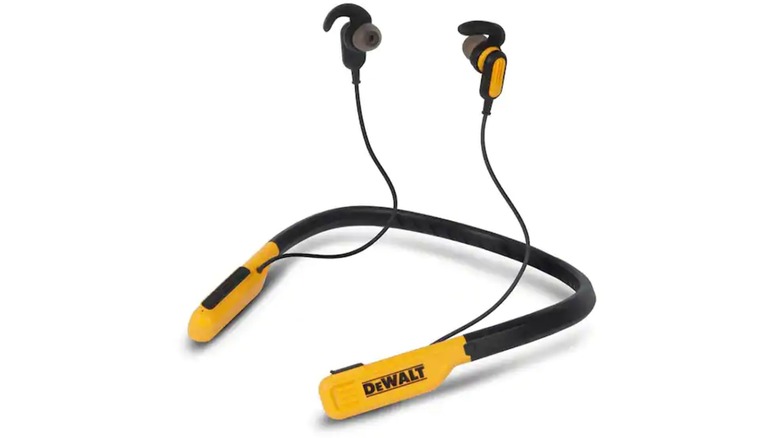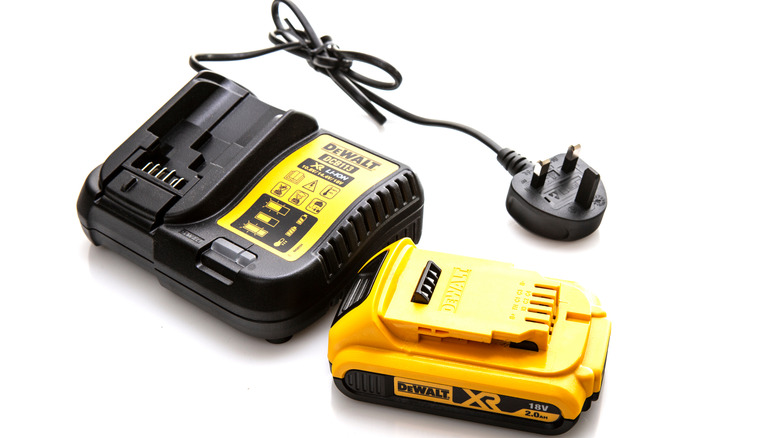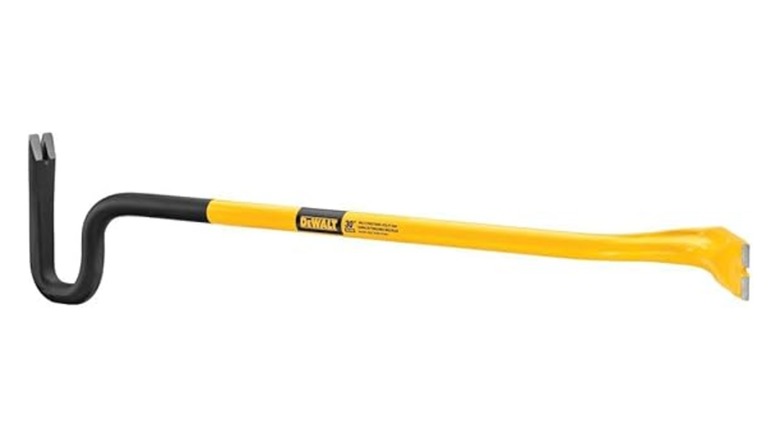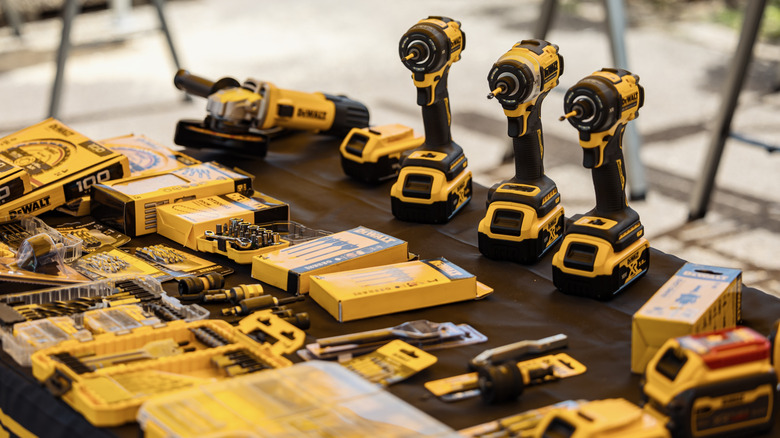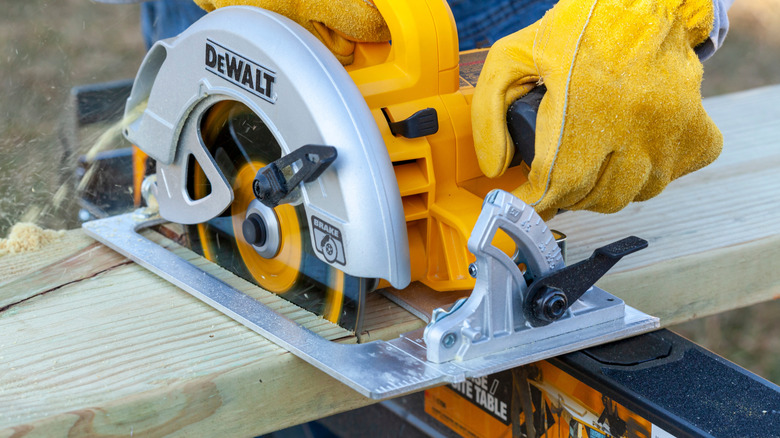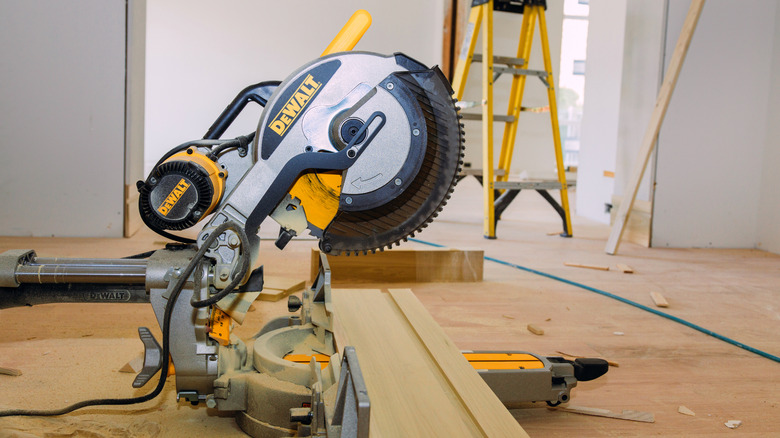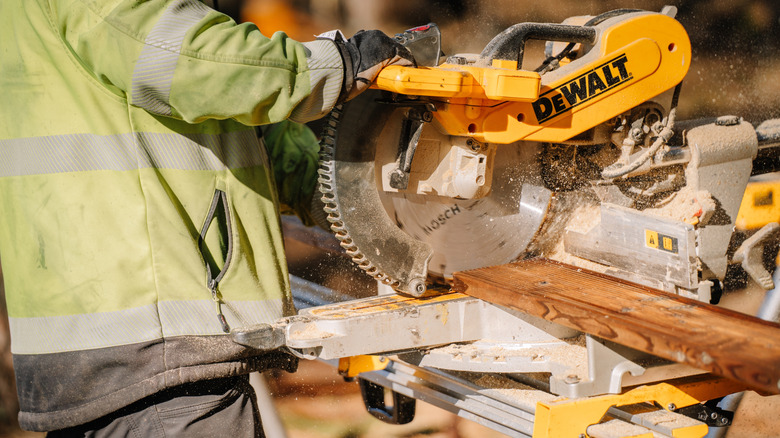12 Of The Biggest DeWalt Recalls In U.S. History
We may receive a commission on purchases made from links.
DeWalt is perhaps most well-known for being one of the biggest cordless drill brands available, but the company has a vast catalog of power tools, equipment, and hand tools to assist both trade professionals and amateur DIYers with home projects.
Whatever repair or renovation you plan to tackle next, chances are there's a DeWalt tool that can make the process easier. That said, there are a few things you should know before buying DeWalt tools, including which tools you should avoid because they were involved in huge recalls. Of course, there are some DeWalt tools you should avoid due to negative owner reviews, but the tools we've rounded up here are specifically ones you should avoid buying because they were involved in the biggest DeWalt recalls in U.S. history.
Since these tools have been recalled, you can't buy them new anymore — although upgraded versions may still be available. However, if you're looking to save money by sourcing used tools and equipment, it's a good idea to make sure the listing you're checking out isn't one of these 12 recalled DeWalt products.
DeWalt fiberglass sledgehammers (2.2 million units)
The biggest DeWalt recall in U.S. history surprisingly involved a hand tool with no electrical components involved. In April 2023, about 2.2 million fiberglass sledgehammers were recalled in the U.S. alone from DeWalt, Stanley, and Craftsman. In Canada, an additional 53,000 or so units were recalled.
Multiple sledgehammer models were recalled, weighing between 2 and 12 pounds and measuring between 14- and 36-inches. The sledgehammers were pulled from shelves because the top piece, called the head, could "loosen prematurely and detach unexpectedly," which obviously posed a major impact risk to consumers. According to the U.S. Consumer Product Safety Commission (CPSC), there were 192 reports in which the sledgehammer head detached. Two reports specifically noted injuries to the face and head from the accident.
The recalled sledgehammers sold for $18 to $26 at Home Depot, Ace Hardware, and other major retailers from November 2013 through November 2022. When the recall was announced, consumers were encouraged to stop using the sledgehammers immediately and reach out to provide contact information to receive a full refund.
DeWalt 12-inch sliding compound miter saws (1,253,741 units)
The recall of roughly 1.25 million 12-inch sliding compound miter saws is not only one of the biggest DeWalt recalls, but it's one of the biggest power tool recalls in U.S. history across all major power tool brands. Furthermore, those 1.25 million units are just in the US — about 118,000 more were sold and recalled in Canada.
This huge recall happened in August 2022 when the CPSC reported that the "miter saw's rear safety guard can break or detach." This defect could cause projectiles to hit the user or others around them, or potentially cause lacerations if the user inadvertently touched the un-guarded blade. In total, DeWalt received a whopping 571 reports of this miter saw's rear safety guard coming off or breaking, nine of which specifically noted laceration injuries.
Originally sold for $600 to $820 between April 2019 and May 2022, these miter saws weren't refunded entirely to consumers, but instead were repaired for free at a DeWalt service center. Consumers were instructed to stop using the saw right away, and then to contact DeWalt to get their saw repaired for free or to receive a free repair kit instead.
DeWalt battery chargers (1.7 million units)
Overheating and other battery-related issues seem to be common in the world of power tool recalls. This particular recall involved roughly 1.7 million battery chargers from DeWalt and Black+Decker, due to a terrifying risk of the battery bursting after failing to shut off automatically after fully charging, something these chargers were supposed to be able to do.
More specifically, the CPSC said the battery chargers posed "fire, burn and electrical shock hazards to consumers." DeWalt received two consumer reports of the batteries actually bursting and causing injuries, which include "minor lacerations and a minor burn."
The recalled battery chargers were originally sold for $50 to $60 between May 1996 and August 2000, and were pulled from shelves in December 2000. There wasn't an available fix for this issue, so consumers were told to stop using the chargers at once and bring them into a nearby DeWalt or Black+Decker service center to get a free replacement.
DeWalt 18-volt battery packs (755,000 units)
Many battery-related recalls involve overheating risks or potential fire hazards, but not this one. In March 2000, about 755,000 DeWalt 18-volt battery packs were recalled because the clips holding the battery packs in place could come loose and allow the battery to fall out.
Each battery pack weighed roughly 2.2 pounds, so if it fell from a good distance or at the right angle, it could cause some major damage. In total, DeWalt collected 53 reports of these 18-volt battery packs falling out of tools. Five of the reports sent to the CPSC detailed injuries, with one noting "a battery pack striking a consumer on the head."
The battery packs were only sold for a short period of time, between May 1997 and June 1998, and retailed for $70 to $85. When the recall was issued, consumers were told to stop using the battery pack as-is immediately and then to call DeWalt to receive a free repair kit to fix the issue.
DeWalt corded electric screwdrivers (660,000 units)
In November 1998, about 660,000 corded electric screwdrivers were recalled because they posed shock risks to consumers due to the internal wiring design. These screwdrivers were sold for $69 to $169, depending on the model, under DeWalt, Grabber, and Black+Decker at major hardware stores across the U.S. between November 1996 and September 1998.
According to the CPSC, DeWalt received 40 consumer reports detailing the "screwdrivers causing shocks during use," and three of these reports noted injuries that directly stemmed from the shocks.
To remedy the issue, consumers were instructed to stop using the screwdrivers right away until they could take them into a DeWalt or Black+Decker service center to receive a repair free of charge. This recall only affected 24 different corded electric screwdriver models from DeWalt, Grabber, and Black+Decker, but the CPSC specifically notes that no cordless screwdrivers sold at the same time were involved.
DeWalt cordless drills (346,000 units)
In December 2007, five different DeWalt cordless drill models were recalled, with a total of about 346,000 affected units. The CPSC explains that the issue these cordless drill models were encountering was an overheating trigger switch, which could pose "a fire hazard to consumers." Sometimes, overheating is the result of common mistakes people make when using a cordless drill, but in this case, there was nothing consumers could do to prevent the issue.
DeWalt received 11 different reports of the trigger switches overheating on these particular drill models, which originally retailed for $180 to $280 and were sold between June 2006 and December 2007. Luckily, among the 11 reports received, no injuries or property damage was noted by consumers.
Per the CPSC, consumers were encouraged to stop using the cordless drills at once and contact DeWalt to set up an appointment with a service center to check and, if needed, repair their drill. Despite these cordless drill models facing a big recall, some of the company's new cordless drill models are among the most underrated tools you can find from DeWalt.
DeWalt Jobsite Pro wireless earphones (301,800 units)
When you think of DeWalt products, your mind probably goes to a tool or a piece of equipment, but DeWalt occasionally comes out with accessories outside its usual product lineup, like these wireless earphones. However, this unique DeWalt accessory didn't last long.
In December 2021, more than 300,000 Jobsite Pro wireless earphones were recalled in the U.S. These headphones had been sold for roughly $60 at Home Depot, Lowe's, and other hardware and electronics stores throughout the country between December 2019 and July 2021.
You can find an updated version of these headphones today, but there's no fixing any of the units involved in the recall. According to the CPSC, the wireless earphones were pulled from shelves due to overheating issues while charging or while in use, "posing burn and fire hazards" to consumers.
Consumers were instructed to stop using the earphones right away and to contact E-filliate to get a prepaid shipping label to send the product back and receive either a full refund or a replacement free of charge.
DeWalt One-Hour battery chargers (150,000 units)
A one-hour battery charger sounds like a dream when you're dealing with cordless, battery-powered tools and you're on a tight deadline for a project. But this particular one-hour battery charger from DeWalt had roughly 150,000 units recalled in August 1996 because, if dropped or otherwise subject to "severe impact," the plastic housing around the charger could end up "exposing internal electrical components that could present an electric shock hazard."
According to the CPSC, DeWalt didn't receive reports or injuries or of the charger breaking at the time the recall was issued. It's unclear how the issue was discovered, but regardless, swift preventative measures were taken to pull these chargers from shelves.
For anyone who purchased one of these defective battery chargers for $39 to $59 between August 1995 and April 1996, the recommended action was to return the charger to a DeWalt or Black+Decker service center and receive a free replacement one-hour battery charger in exchange.
DeWalt multi-functional utility bars (145,000 units)
Approximately 145,000 DeWalt multi-functional utility bars were recalled in September 2019 because it could potentially "break while being used for prying," an essential action of a utility bar. Per the CPSC, this defect created "an injury hazard to the user." Proving that statement, DeWalt received 4 out of 56 reports that detailed injuries caused by the utility bars breaking.
These utility bars were originally sold for $30 to $40 at Home Depot and other major hardware stores across the US between December 2015 and March 2019. Consumers who purchased a utility bar involved in this fast-track recall could contact DeWalt and get a refund.
A utility bar may not earn a spot as one of the most affordable DeWalt tools every homeowner's toolbox should include, but it's an incredibly helpful hand tool for home projects that involve a lot of prying or lifting, like changing out the flooring in your home.
DeWalt DWD110/DWD112 drills
Due to an issue with the drill's wiring potentially coming in contact with other internal moving parts, approximately 122,000 DeWalt DWD110 and DWD112 drill models were pulled from shelves in early 2019. The recall was first independently announced in January 2019, but wasn't announced by the CPSC until February 2019 because of a government furlough.
While this drill's wiring reportedly posed "a shock hazard" to consumers, no injuries or incidents were ever reported. These drill models were sold for $60 to $70 between September 2017 and November 2018 at Home Depot, Lowe's, and other hardware and online retailers. To anyone who purchased one of the two recalled drill models, it was recommended to stop using the drill right away and get in contact with DeWalt to set up an inspection and repair free of charge.
Although it's not the same particular drill model, another one of the company's drills landed a spot among DeWalt tools you should steer clear of. DeWalt makes some fantastic drills, but a few of the lower-end models don't offer great value.
DeWalt framing saws and circular saws
Roughly 97,000 framing saws and 37,000 circular saws were recalled in November 2006 because the CPSC received complaints that the "lower blade guard can fail to close, leaving the blade exposed," which obviously posed a huge risk to consumers. Of the four reports DeWalt received regarding this recall, three consumers required medical attention, with one user sustaining lacerations to their hand and two users sustaining lacerations to the leg.
The framing saw models involved in the recall were sold for roughly $170 between January 2003 and August 2006, and the circular saw models involved retailed for $380 to $880 between May 2006 and September 2006. The remedy for both affected framing saws and affected circular saws was the same — stop using the saw at once, and get in touch with DeWalt to receive a free repair.
If you're in need of a circular saw that hasn't been subject to a nationwide recall, check out the 20V Max 6-½-Inch circular saw, a DeWalt tool that's a no-brainer at its price.
DeWalt 12-inch miter saws
The debate between a circular saw versus a miter saw could go back and forth for ages, but one thing is clear — neither tool is free from being subject to a scary recall.
The company recalled thousands of circular saws in 2006, and in January 2001, the CPSC reports that DeWalt had to recall about 112,000 12-inch miter saws because the "bolts on the saws [could] loosen and the blade could detach," presenting a pretty severe laceration risk to consumers. DeWalt actually received seven different reports from consumers who received lacerations as a direct result of this issue.
Although the recall was issued in early 2001, these miter saws were actually sold between January 1992 and December 1993, ranging in price from $330 to $410. For consumers who had purchased one of the two miter saw models affected, they were advised to stop using the saw at once and contact DeWalt to get a replacement bolt to fix the issue free of charge.
Methodology
To find the biggest DeWalt recalls in U.S. history, the CPSC was our main resource. We took the time to manually comb through all of DeWalt's available recall documentation on the website. To compile this list, we strictly looked at the number of units involved in each recall and ordered them from the most units involved to the least units involved.
It's worth noting that just because DeWalt has been involved in multiple big product recalls, that's been over the past few decades. The company has multiple reliable, fan-favorite products that are worth buying today. Even with in-depth manufacturing and production tests, sometimes little things get missed, so the biggest takeaway here is that you should always register your power tools and other equipment so you can be informed of recalls as soon as possible.
